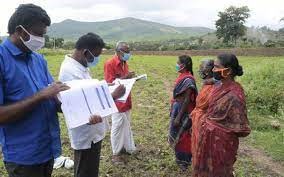Ensure patta and effective implementation of Forest Rights Act for tribal people: Study
- A study in the hill areas of Kadambur and Bargur revealed that creation of jobs locally, distribution of patta for their holdings and effective implementation of the Forest Rights Act (FRA), 2006, will prevent migration of tribal people to other places in search of livelihood.
- Indian Council of Social Science Research (ICSSR), a national body overseeing research in the area social sciences in India, had made a special call for studies focusing on social science dimension of COVID-19 pandemic.
- As part of it, N. Mani, Professor and Head, Department of Economics, Erode Arts and Science College, was awarded a project titled, “A Study on Rainfed Agriculture: An Instrument for Creation of Gainful Employment and Cornerstone for Counter Migration”. The nine-month project was allotted a budget of ₹4.30 lakh and the team led by its project director Mr. Mani and research associate P.G. Balasubramanian visited the habitations in the two hills.
- The team met 286 families in Kadambur and 156 families in Bargur who migrated for work to the plains, but had to return to their natives due to the pandemic. The study revealed that tribal people have the right to use revenue poramboke land, but have no patta.
- “In the absence of title deed, they cannot avail subsidy or loans and their crops were not covered under insurance scheme”, said Mr. Mani. Since the lands are rain-fed, tribal people are unable to meet the loss arising out of poor rainfall leading to crop failure.
- “They were forced to borrow money at exorbitant interest rates and hence, families stress on the need for having patta for their small holdings”, he added. The professor said that recognising them as farmers would be a major step in preventing them from migration.
- During migration, parents take their children with them who become child workers. The study also revealed that most of their children never attended schools or were school dropouts. Many families were involved in harvesting broom grass from the forest areas in Bargur and Gundri, but were selling it to intermediaries for a meagre price. Hence, value addition would improve their livelihood, including making furniture from Lantana camara, the study revealed.
- V.P. Gunasekaran, State committee member, Tamil Nadu Tribal People Association, who accompanied the team, said that tribal people face many hurdles in collecting minor forest produce and the only permanent solution is effective implementation of FRA. “Local jobs ensuring regular employment, ownership of land, improved education system in hill areas and value addition for products will ensure tribal people stay in their habitations”, he added.

